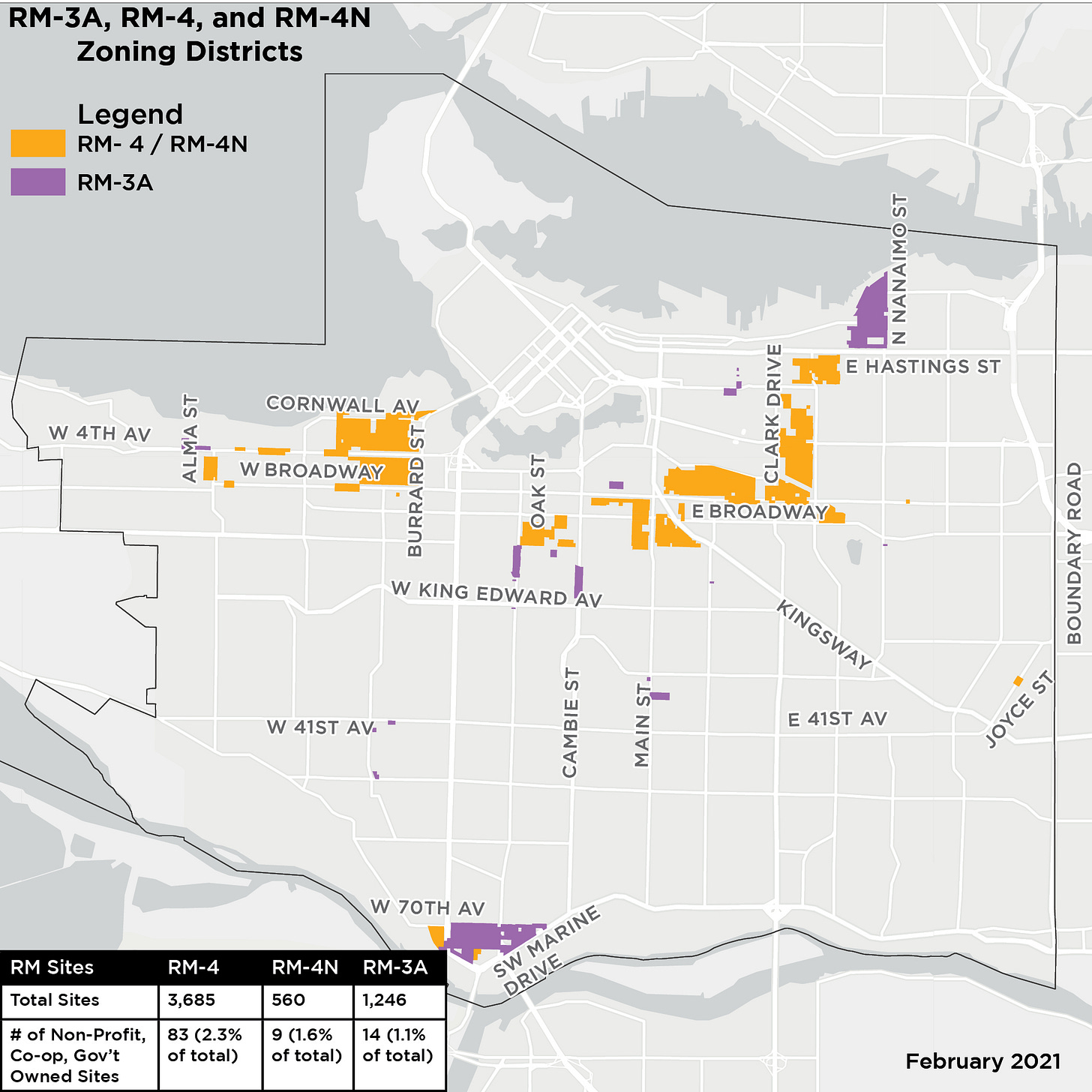Allowing 12-storey social housing projects
Non-profit housing projects also benefit from "Vitamin D," density
Rezoning is a time-consuming and expensive process. It’s a barrier to market housing, but it’s also a barrier to non-profit housing. Typically these are mixed-income rental projects with at least 30% below-market rentals, cross-subsidized by the 70% market rentals.
For a non-profit housing project, rezoning can easily take a year, and add $500,000 to $1 million to the cost of the project. (William Azaroff of Brightside Homes describes one project where rezoning added $4 million to the cost.) In addition, the provincial and federal governments prefer to fund projects which don’t require rezoning, because of the risk that the rezoning will fail.
In April 2021, Vancouver city council voted to approve a staff recommendation making six-storey social housing legal in multi-family zones RM-3A, RM-4, and RM-4N, without requiring a rezoning. There were about 100 written comments to council, more in favour than opposed. Colleen Hardwick was the only councillor who didn’t support it (she abstained).
Making up to 12 storeys legal
In May 2021, Christine Boyle followed up with a motion to increase the maximum height further, to 12 storeys, in the same zones, based on advice from staff that more ambitious changes should be brought forward as a separate motion. This time it took three days to hear from all the speakers, with 14 in support and 82 opposed. The motion failed, with only Boyle, Kennedy Stewart, and Jean Swanson voting in favour.
After a gap of more than a year, council can reconsider an earlier vote. In December 2022, after the October election, Christine Boyle brought a similar motion forward, noting that during the election campaign, most of the incoming council members had answered yes to the following question from Women Transforming Cities:
Will you commit to reducing barriers to providing non-market housing by delegating authority to city staff to approve non-profit, co-op, and social housing initiatives of up to 12 stories in multi-family areas, and up to six stories in other residential areas, without a rezoning requirement?
This time there were 32 speakers supporting the motion (including me) and seven opposed. ABC’s Mike Klassen introduced an amendment which basically added more questions for staff to answer; the ABC majority then voted in favour of the amended motion, so it passed unanimously.
This does not mean that 12-storey social housing projects are now legal. City staff still need to come back with recommendations which will then be voted on by council, following a public hearing.
My speaking notes
I’m calling to support making it easier for non-profits to build up to 12 storeys of housing, within zones that already allow multifamily housing.
As I understand it, the economic viability of non-profit housing projects isn't that different from for-profit rental housing. In either case, the stream of future rents has to pay for the costs of construction, and for the cost of acquiring the land. Construction costs include materials, labour, development charges, and financing costs. The difference is that for a non-profit project, the construction costs don’t need to include a profit margin.
When a housing project includes more affordable apartments, there's cross-subsidization between the market-rate apartments and the below-market ones. The key thing is that the total value of future rents has to pay for construction costs and for land.
As costs rise, with interest rates rising and inflationary pressure on materials and wages, fewer projects are economically viable. One key way that the city can help is by allowing non-profits to build taller buildings, because a taller building supports a larger stream of future rents, making it easier to cover construction costs.
Besides allowing more housing to be built, especially below-market housing, this proposal has a second major advantage. It would reduce the time council needs to spend on rezonings for non-profits. The 2022 election results made it clear that the number of voters who fear and oppose new housing is relatively small. Only 10% of the electorate voted for TEAM. But the public hearing process tends to amplify their voices. In an election, 100 voters is a very small number. At a public hearing, 100 speakers translates to 10 hours or more, depending how many questions they get. Even when the final decision is yes, it’s a very time-consuming process.
One of the key recommendations from the recent expert panel on housing supply in BC is that city councils should focus on setting overall policy, rather than spending a lot of time making a decision on each and every individual site. Given the shortage of housing, and ABC's commitment to streamlining the process of getting approval, this seems like an excellent opportunity for council to move forward along these lines.
Links
Creating and renewing non-profit social and co-op housing. City website.
Vancouver’s affordable housing announcements remain unfulfilled years later (May 2021), by Frances Bula in the Globe and Mail. Describes how slow it is for non-profit housing projects to get approved. It’s not just rezoning - permitting is also slow.
Mixed-income developments are the most effective way of getting more non-profit homes built (June 2021), by Jill Atkey and Thom Armstrong in the Vancouver Sun.
Vancouver to explore ways to fast-track social housing developments (December 2022), by Dan Fumano, after the vote.

